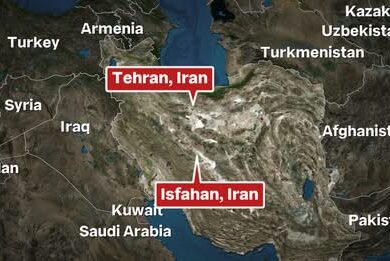Trump’s move against Iran may draw more criticism from MAGA’s anti-interventionists
Trump’s Iran Strike Fractures MAGA Base, Igniting Fierce Backlash from Anti-Interventionist Allies
Washington D.C. – President Donald Trump’s recent decision to launch airstrikes against three nuclear facilities in Iran has sent shockwaves through the global community and, perhaps more significantly, has opened a deep and public fissure within his own “Make America Great Again” movement. Prominent anti-interventionist voices, who have been steadfast allies and powerful amplifiers of the Trump brand, are now openly condemning the military action, accusing the President of betraying a core tenet of his “America First” platform: the end of “forever wars.”
The U.S. military action, conducted in coordination with an ongoing Israeli offensive against Iranian targets, was announced by the President himself on Saturday. In a social media post, Trump stated that the strikes on facilities at Fordow, Natanz, and Esfahan were “very successful” and carried out to prevent Iran from obtaining a nuclear weapon.
While the move was praised by neoconservative hawks, it was met with immediate and blistering criticism from the influential anti-war faction of his base. Figures like Tucker Carlson, former Fox News host and a powerful voice in conservative media, have been leading the charge. Carlson, who just days ago was headlining large rallies with Trump, has been scathing in his critique, suggesting the President’s posture breaks his pledge to keep the United States out of new foreign entanglements.
“You’re not going to convince me that the Iranian people are my enemy,” Carlson declared on a recent podcast, a sentiment that has resonated deeply with a significant portion of Trump’s supporters who were drawn to his 2016 and 2024 campaigns by his promises to extricate the U.S. from costly and bloody conflicts in the Middle East.
The sentiment was echoed by other key MAGA figures. Rep. Marjorie Taylor Greene (R-GA), a staunch Trump loyalist, took to social media to state, “Anyone slobbering for the US to become fully involved in the Israel/Iran war is not America First/MAGA. We are sick and tired of foreign wars. All of them.”
Steve Bannon, a former White House chief strategist and a leading voice of the populist-nationalist wing of the party, warned that a war in the Middle East could “blow up the coalition” that brought Trump to power. He emphasized that avoiding such conflicts was a “core tenet” of the MAGA movement.
Even Alex Jones, the controversial Infowars host, expressed his dismay, posting a meme depicting a morphed image of Trump and former President George W. Bush, who is often criticized by this faction for the wars in Iraq and Afghanistan. The caption read: “What you voted for” versus “What you got.”
For his part, President Trump has appeared dismissive of the criticism from his erstwhile allies. He publicly rebuked Carlson, calling him “kooky” and insisting on the necessity of preventing a nuclear-armed Iran. “Somebody please explain to kooky Tucker Carlson that,’ IRAN CAN NOT HAVE A NUCLEAR WEAPON!'” Trump posted on his social media platform. According to White House sources, Carlson later called the President to apologize for the harshness of his tone, a claim that has done little to quell the public and ideological nature of the dispute.
This schism highlights a fundamental tension within the modern Republican party, a coalition that includes both traditional defense hawks and a growing and vocal anti-interventionist wing that is deeply skeptical of foreign entanglements. Trump, throughout his political career, has managed to appeal to both factions, often by speaking the language of the anti-war base while pursuing a foreign policy that has, at times, been aggressively interventionist.
During his first term, Trump withdrew the U.S. from the Iran nuclear deal, a move lauded by hawks. His administration also carried out the assassination of Iranian General Qasem Soleimani in 2020. However, he also frequently railed against the “endless wars” and prided himself on not starting new ones.
Analysts suggest this latest move against Iran may be a gamble that he can maintain the loyalty of his base despite the apparent contradiction. Marc Short, an ally of former Vice President Mike Pence, described the division within Trump’s party as a “pretty large rift,” but speculated that ultimately, “most of the president’s followers are loyal to him more so than any worldview.”
As the situation in the Middle East remains volatile, the coming weeks will be a critical test of that loyalty and could determine whether the anti-interventionist wing of the MAGA movement will fall back in line or if this break represents a more permanent and consequential realignment in conservative foreign policy.




